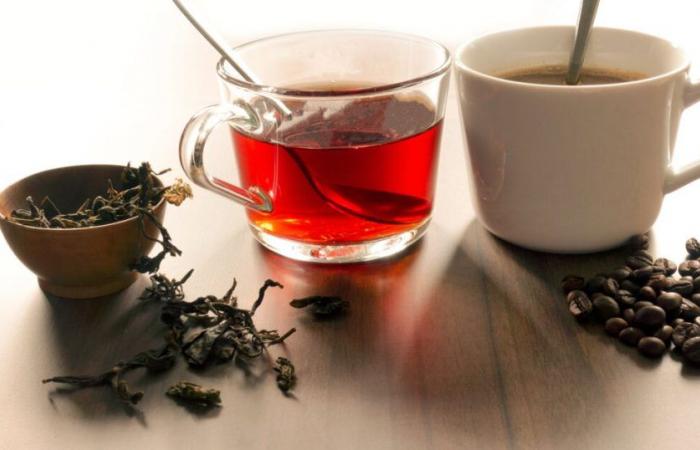Scientists test breakfast champions. Coffee beans or tea leaves, both help prevent a large number of diseases.
Every morning, two clans clash: the supporters of the boost opt for coffee, the supporters of gentle awakening choose tea. At the global level, the second has the advantage: after water, it is the most drunk beverage. In France, on the other hand, we prefer the little black. Each year, we consume around 5.1 kg of coffee per capita compared to only 230 g of tea. Good news, these habits are also beneficial for health : hundreds of studies show the preventive functions of these two drinks against cardiovascular diseases and certain cancers, particularly of the digestive sphere. In question, their active substances, including caffeine and polyphenols with antioxidant effects. In addition to these common benefits, each has its own advantages. Choose your side.
Coffee yes, but not too much
Coffee has a bad reputation. It annoys, increases anxiety, makes people tremble. Undeniable effects… only from five to six cups per day. In smaller quantities, it is rather beneficial. Migraineurs know its vasoconstrictor action, useful in preventing headaches. But that’s not all. According to a 2022 study published in European Journal of Preventive Cardiology Drinking 2 to 3 cups of coffee per day significantly reduces cardiovascular events. The same goes for type 2 diabetes: even decaffeinated, it halves the risk, provided you drink at least four cups daily. Chinese researchers explain this peculiarity by the action of caffeic acid and chlorogenic acid, which inhibit the transformation of amylin – a pancreatic hormone – into a toxic form.
Another advantage, its consumption affects memory : several epidemiological and experimental studies attest to a benefit in cases of Alzheimer’s and Parkinson’s disease. In Lille, in 2021, a phase 3 study is evaluating the effect of caffeine on the cognitive functions of patients suffering from an early or moderate form of this neurodegenerative disease (CAFCA study). Has this drink become a panacea? Not quite. Even if coffee boosts concentration, it continues to be not recommended for pregnant women and also remains bad for the development of growing young people due to the disruption it causes in the first sleep cycles.
The health benefits of coffee
Tea, yes but especially green
Tea enjoys good press thanks to the longevity of Asians who are large consumers of it. This advertisement even produced a small revolution in France: we drink more and more green tea. A healthy habit, because the gallated catechins (polyphenols) it contains are now known to reduce the level of glucose in the blood. Drinking one or two cups during the meal could limit weight gainaccording to a South Korean study from 2013. In 2021, researchers from ETH Zurich (ETH) highlighted its action against stress. Already in 2007, Japanese researchers demonstrated that this de-stressing effect on the brain was due to theanine. It is also because of this compound that tea does not give a boost like coffee, even though it contains theine.
At the oral level too, this drink can prove useful. Rich in fluoride, it helps fight against cavities. But beware of its coloring effect: in excess, fluoride causes yellow or brown stains to appear on the teeth. However, the longer the leaves remain on the tea plant, the more fluoride accumulates there. It is therefore preferable not to buy black tea very cheaply, as it is often made from the oldest ones.
Another unexpected benefit is that it prevents arthritis. An American team has shown that by drinking three or four cups a day, the amount of proteins and enzymes that damage the joints decreases. In mice, injections of gallated catechins even significantly reduced the number of individuals developing arthritis, according to a South Korean study dated 2014.
To take full advantage of the benefits of teathe method of preparation is essential: let it infuse between 3 and 5 minutes, until 80% of the caffeine and 85% of antioxidants are diffused. Afterwards, the taste becomes more bitter. Fans of tea bags, shake it so that the components are released more easily. Be careful, however: ingested in large quantities, tea slows down the absorption of iron of plant origin by the body. It is therefore not recommended for people suffering from deficiencies, particularly pregnant women, to drink it during meals.
The health benefits of tea
- Tea prevents arthritis.
- It helps fight cavities.
- It reduces stress and associated illnesses.
- Green, it does not make you lose weight but limits weight gain.
You may also be interested in:
⋙ Matcha: how is this tea good for your health?
⋙ Drinking coffee on an empty stomach in the morning: are there any health risks?
⋙ To avoid memory loss, drink tea and eat apples!
⋙ What is the highest caffeine coffee?






